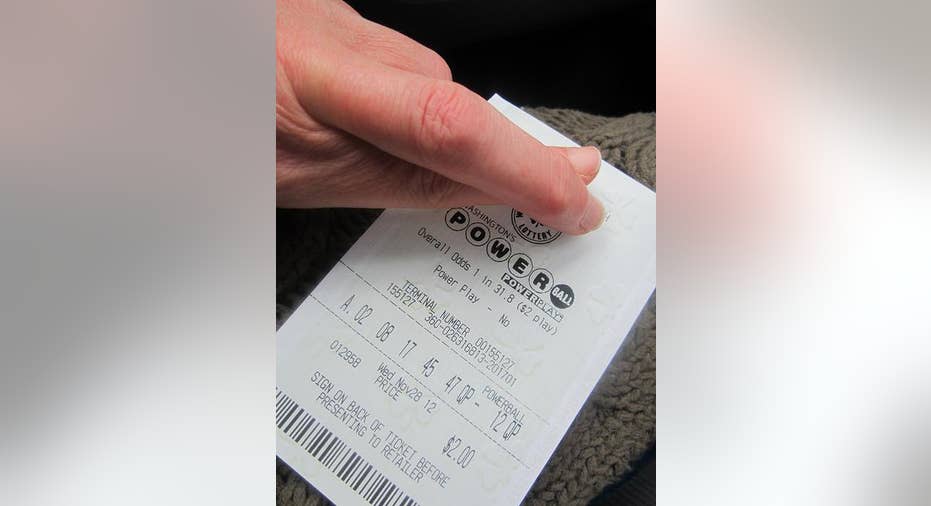Forget Powerball: Here's How to Create Your Own Jackpot

Image source: Flickr user Upupa4me
The Powerball jackpot on Saturday, Jan. 9, is expected to be $800 million,the largest jackpot in U.S. lottery history. While it may be tempting to run out and spend your hard-earned money on a stack of Powerball tickets, you're probably better off putting that cash to work in other ways.
Just how tough is it to win the Powerball?Some refer to the lottery as a "tax on stupidity" because its odds are so terrible -- even as far as gambling is concerned. That may be a bit harsh, but you can't argue with the statistics. The average payout percentage for lottery tickets nationwide is just 60%, meaning that for every dollar collected, only $0.60 is paid out as prizes. By contrast, slot machines are typically programmed to pay out 82% to 98% of the money taken in.
|
Form of Gambling |
Typical Payout Percentage |
|---|---|
|
Slot machines |
82%-98% |
|
Blackjack (with correct strategy) |
99.5% |
|
Video poker |
As high as 99.54% |
|
Lottery tickets |
60% |
While the Powerball payout technically gets better as the jackpot rises, it's still a sucker's bet. The odds for winning lesser prizes are unfavorable, and the chances of winning the coveted jackpot are one in 292.2 million. To put the odds of winning in perspective, consider these facts:
- You are 195 times more likely to become a movie star than to win the Powerball
- You are 441 times more likely to win an Olympic gold medal
- You are 2,166 times more likely to die from a lightning strike
- You are 25.4 times more likely to be attacked by a shark
- You are 29.2 times more likely to become president of the United States
Also keep in mind that if the winner decides to take a lump sum, it won't look anything like $800 million, especially after Uncle Sam takes a bite out of it. In fact, the winner can expect to walk away with $372 million, and that's if they live in a state that doesn't tax lottery winnings.
A better ideaI have dozens of friends who play every single Powerball drawing, and some even spend $100 on tickets when the jackpot gets large. I bet you can guess how many of them have won a jackpot or even a large prize.
What if these lottery players were to invest some of their Powerball money instead? Let's say you spend $10 every week on lottery tickets. If you take that same amount and invest it in an S&P 500 index fund instead, how much do you think you could have after 20 years? Maybe $10,000 to $15,000?
Think bigger.
Based on the stock market's historical returns of about 10% per year, those $10 weekly investments could add up to more than $28,000 over 20 years. After 30 years, you could have nearly $78,000. Keep in mind that this assumes you're investing just $10 per week. Imagine how much you could wind up with if you saved $20, $50, or even $100-plus each week.
And if you're lucky enough to have time on your side, get this: If you invest $300 a month (about 7% of the typical American's salary) and match the stock market's historical returns, then in 35 years you'll be a millionaire.
What would you rather have -- an infinitesimal chance of striking it rich in the lottery or a legitimate opportunity to build a six- or seven-figure nest egg?
Have your fun, but think about the futureMy point here is not to discourage you from having fun. If you truly enjoy taking a shot at the Powerball jackpot, then there's no harm in buying a ticket or two purely for entertainment purposes. However, you should understand just how small your chances of winning are and think about putting some of your lottery ticket money to work on a safer bet that can pay off tremendously.
The article Forget Powerball: Here's How to Create Your Own Jackpot originally appeared on Fool.com.
Try any of our Foolish newsletter services free for 30 days. We Fools may not all hold the same opinions, but we all believe that considering a diverse range of insights makes us better investors. The Motley Fool has a disclosure policy.
Copyright 1995 - 2016 The Motley Fool, LLC. All rights reserved. The Motley Fool has a disclosure policy.



















